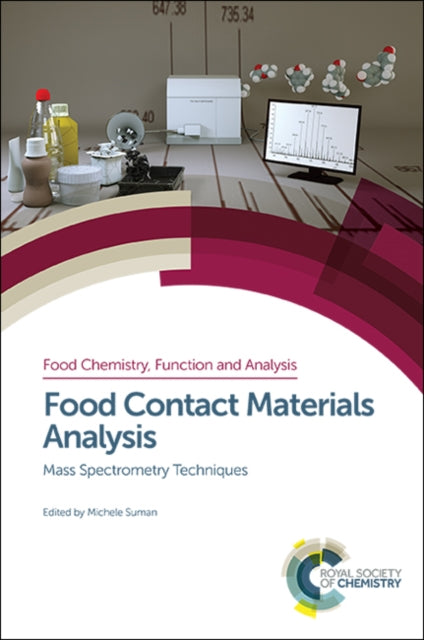Shulph Ink
Food Contact Materials Analysis: Mass Spectrometry Techniques
Food Contact Materials Analysis: Mass Spectrometry Techniques
YOU SAVE £7.15
- Condition: Brand new
- UK Delivery times: Usually arrives within 2 - 3 working days
- UK Shipping: Fee starts at £2.39. Subject to product weight & dimension
Bulk ordering. Want 15 or more copies? Get a personalised quote and bigger discounts. Learn more about bulk orders.
Couldn't load pickup availability
- More about Food Contact Materials Analysis: Mass Spectrometry Techniques
Mass spectrometric techniques have become essential in food processing and packaging, providing quick and efficient quality control methods. This book outlines how ingredients and their interactions with processing and packaging have evolved, offering practical protocols to stakeholders.
Format: Hardback
Length: 273 pages
Publication date: 25 January 2019
Publisher: Royal Society of Chemistry
Over the past few years, mass spectrometric techniques have undergone remarkable advancements, providing ever-growing solutions to address challenges in food processing and packaging. The slightest contamination in food can pose significant difficulties for food production companies, prompting them to seek rapid and efficient quality control methods. This comprehensive book delves into the evolution of ingredients and their interplay with processing and packaging, leveraging the power of mass spectrometry. It offers practical protocols to stakeholders, showcasing the versatility of this technique. With a global impact, this book is of interest to food packaging scientists and mass spectrometry practitioners alike.
Mass spectrometry has revolutionized the field of food processing and packaging by offering unprecedented precision and sensitivity in identifying and quantifying trace contaminants. This technology has become essential in ensuring the safety and quality of food products, as even the smallest amount of contamination can have serious consequences for consumers.
One of the key advantages of mass spectrometry is its ability to identify a wide range of contaminants, including pesticides, heavy metals, and bacteria. Traditional methods of contamination detection, such as visual inspection and sensory analysis, are often limited in their ability to detect these contaminants, particularly at low levels. Mass spectrometry, on the other hand, can detect these contaminants at parts per billion or even parts per trillion levels, making it highly effective in identifying and controlling contamination.
Another advantage of mass spectrometry is its ability to provide detailed information about the composition and structure of food products. This information can be valuable in developing new food products, improving existing products, and ensuring compliance with food safety regulations. For example, mass spectrometry can be used to analyze the protein content of food products, which can help manufacturers optimize the nutritional value of their products while also reducing the risk of food allergies.
Mass spectrometry has also been used in the development of new packaging materials and technologies. For example, the use of edible films and coatings made from natural materials has gained popularity in recent years as a sustainable alternative to traditional plastic packaging. Mass spectrometry can be used to analyze the composition of these materials and ensure their safety and efficacy in preserving food products.
In conclusion, mass spectrometric techniques have played a crucial role in improving the safety and quality of food products. By providing accurate and detailed information about the composition and structure of food products, mass spectrometry has enabled food manufacturers to develop new products, improve existing products, and ensure compliance with food safety regulations. Additionally, the use of mass spectrometry in developing new packaging materials and technologies has helped to reduce the environmental impact of food packaging while also preserving the quality of food products. As the technology continues to evolve, it is likely to play an even more significant role in the food industry in the years to come.
Weight: 576g
Dimension: 165 x 241 x 18 (mm)
ISBN-13: 9781788011242
This item can be found in:
UK and International shipping information
UK and International shipping information
UK Delivery and returns information:
- Delivery within 2 - 3 days when ordering in the UK.
- Shipping fee for UK customers from £2.39. Fully tracked shipping service available.
- Returns policy: Return within 30 days of receipt for full refund.
International deliveries:
Shulph Ink now ships to Australia, Belgium, Canada, France, Germany, Ireland, Italy, India, Luxembourg Saudi Arabia, Singapore, Spain, Netherlands, New Zealand, United Arab Emirates, United States of America.
- Delivery times: within 5 - 10 days for international orders.
- Shipping fee: charges vary for overseas orders. Only tracked services are available for most international orders. Some countries have untracked shipping options.
- Customs charges: If ordering to addresses outside the United Kingdom, you may or may not incur additional customs and duties fees during local delivery.


